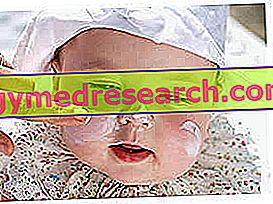Signs and symptoms

The first sign that our body sends us is the change in color in the enamel that loses its natural luster and becomes more opaque. This characteristic in the eyes of the less experienced generally passes unnoticed. When the caries gets to hit the dentin, a dark groove is clearly visible, containing a stagnation of decayed material (food and broken dental tissues).
When the patient begins to experience toothache, it means that the cariogenic process has gone deep, to the dental pulp. The pain is therefore due to the complication of primary caries.
As the caries evolves, sinking into the dental pulp, the patient's clinical picture tends to precipitate. In such circumstances, caries causes the characteristic symptoms of the disease:
- Bad breath
- Hypersensitivity to hot, cold, sweet, salty and acid
- Pain in the tooth that radiates in the surrounding tissues
To learn more: Caries Symptoms
Complications
Caries, a subtle and subtle disease, causes the gradual destruction of some portions of the dental crown: starting from this stage, carious infection can lead to multiple complications.
When caries destroys the interdental points of contact, the infection degenerates to trigger an inflammation of the interdental papilla (papillitis), the gingival section interposed between two teeth.
If, on the other hand, it affects the gingival margin, caries can give rise to unpleasant chronic gingivitis.
When neglected, the carious lesion leads to inflammation of the pulp (pulpitis), evolving in abscess until the total destruction of the tooth and its root. Among the complications of dental caries, cysts, granuloma, gingivitis, pulp gangrene and, sometimes, pyorrhea can not be missing.
In these cases a simple filling is no longer sufficient and the dentist will have to proceed with the removal of the infected pulp by clogging the root canals of the tooth (devitalization).
Care
The treatment of choice for treating superficial caries is obturation, which is the literal sealing of all the fissures and canaliculi that the bacteria, by assiduously devouring enamel and dentin, have brought to the ominous tooth.
- Caries necessarily requires a dental intervention: in fact, dental tissues cannot heal spontaneously since they do not have regenerative capacity.
The filling cannot be performed when the caries has reached the dentine and begins its unstoppable demolition process even in the dental pulp. In such circumstances, caries gave rise to pulpitis, a serious infection of the pulp tissues which, in order to heal, requires devitalization.
In some cases, caries develops in a negative sense, giving rise to a much more serious lesion than pulpitis, which can be a granuloma or a dental cyst. In the first case, the infection becomes purulent and is confined to the gum, mandibular bone or pulp. Antibiotic treatment, devitalization and apicectomy are the most indicated interventions to reverse the pathology.
If caries degenerates into dental cysts, apicectomy or drainage of the lesion are the most appropriate surgical practices.
In the most extreme cases, or when the tooth is deemed irrecoverable, it is necessary to proceed with the extraction of the same.
Prevent tooth decay
The best gesture of love we can make to safeguard tooth health from caries and other dental infections is undoubtedly put into practice all the basic rules of dental prevention:
- ADEQUATE DENTAL HYGIENE with toothbrush, toothpaste, dental floss and mouthwash. To effectively clean teeth it is necessary:
- Brush them at least three times a day, immediately after each meal or snack
- Use quality toothpastes
- Alternate whitening toothpastes (aggressive) with more delicate toothpastes (to prevent the consumption of tooth enamel)
- Use dental floss at least once a day
- Rinse the mouth with antiseptic mouthwash and enriched with fluorine
- Use a soft or electric bristle brush if possible
- CORRECT FEEDING
Given that the development and proliferation of microscopic teeth enemies are favored by food residues that remain trapped between the dental elements, it is important to associate adequate oral hygiene with proper oral hygiene:
- Limit the intake of simple sugars such as sucrose and glucose as much as possible. Prefer polyalcohols (eg sorbitol, mannitol, xylitol) and acariogenic sugars
- Attention also to complex carbohydrates
- Avoid caramel, bon bon, gummy or sticky foods, which stick to the tooth like suction cups, remaining in the oral cavity for a long time
- Prefer the water enriched with fluoride (but do not overdo it, consult your doctor)
- Take cereals and fish products rich in fluorine (but do not overdo it, consult your doctor)
- Chew food well to strengthen teeth and improve chewing function
- DENTAL SEALING: extremely useful for preventing tooth decay. The procedure involves the application of a special resin on the surface of healthy teeth in an excellent state of health, in order to protect the enamel from possible future cariogenic processes. It is recommended to seal the teeth (in particular, the molars) as soon as they have been replaced by the respective permanents.
- PROFESSIONAL DENTAL HYGIENE: the recommended reminder for professional dental cleaning is six-monthly: dental hygienists suggest scaling every 6 months or, at most, once a year. Professional dental cleaning is extremely advantageous because, in addition to preventing tooth decay and gum disease, it ensures the teeth an enviable state of health even in the long term.
- STOP SMOKING: as we know, smoking is the enemy of the teeth and the oral cavity: the smoking habit is closely related to bad breath, yellow teeth and dental infections. For this reason, it is recommended not to smoke or, if you really can't stop, limit smoking, cigars and cigarettes as much as possible.
- PERIODICAL CHECKS FROM THE DENTIST: very useful to surprise at birth any asymptomatic infections such as caries in its initial stage.



